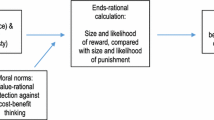Abstract
Teaching ethics poses a dilemma for professors of business. First, they have little or no formal training in ethics. Second, they have established ethical values that they may not want to impose upon their students. What is needed is a well-recognized, yet non-sectarian model to facilitate the clarification of ethical questions. Gestalt theory offers such a framework. Four Gestalt principles facilitate ethical clarification and another four Gestalt principles anesthetize ethical clarification. This article examines each principle, illustrates that principle through current business examples, and offers exercises for developing each principle.
Similar content being viewed by others
Author information
Authors and Affiliations
Additional information
Eugene H. Hunt is professor of management in the School of Business at Virginia Commonwealth University, Richmond. He has done advanced studies in organization development at the National Training Laboratories (NTL) and has studied Gestalt theory at the Gestalt Institute in Cleveland. He currently teaches a course in the history of management thought for doctoral students, in principles of management for masters students, and in organizational behavior for undergraduate students. For a number of years he wrote a column in Management World titled, “Expanding Your Repertoire of Managerial Behavior”.
Ronald K. Bullis is Acting Head of Staff at a Presbyterian Church in Richmond, Virginia. He has done advanced graduate work in clinical social work at Virginia Commonwealth University and is an adjunct faculty teaching law and religion at Virginia Union University, Richmond. He also teaches law and religion at the Institute of Theology at Princeton Theological Seminary. He conducts individual, group and family counseling and is a certified sex educator.
Rights and permissions
About this article
Cite this article
Hunt, E.H., Bullis, R.K. Applying the principles of Gestalt theory to teaching ethics. J Bus Ethics 10, 341–347 (1991). https://doi.org/10.1007/BF00383235
Issue Date:
DOI: https://doi.org/10.1007/BF00383235




